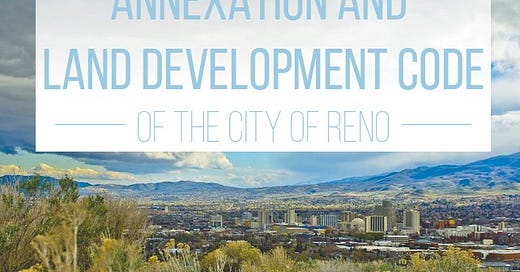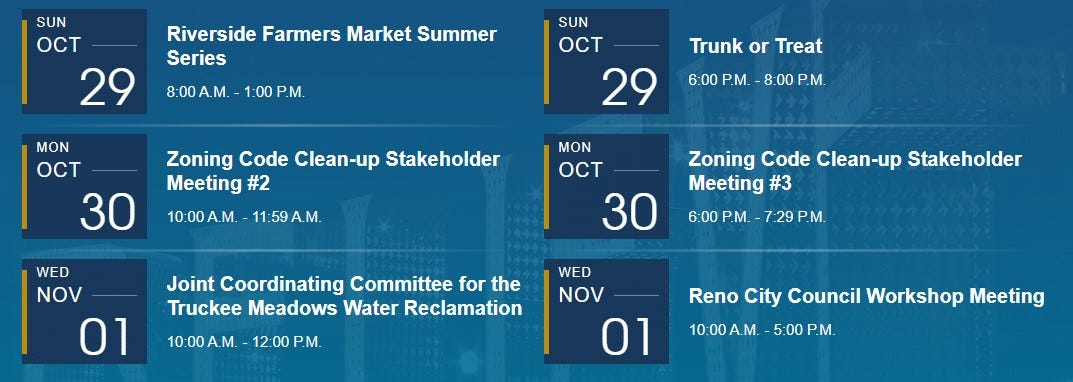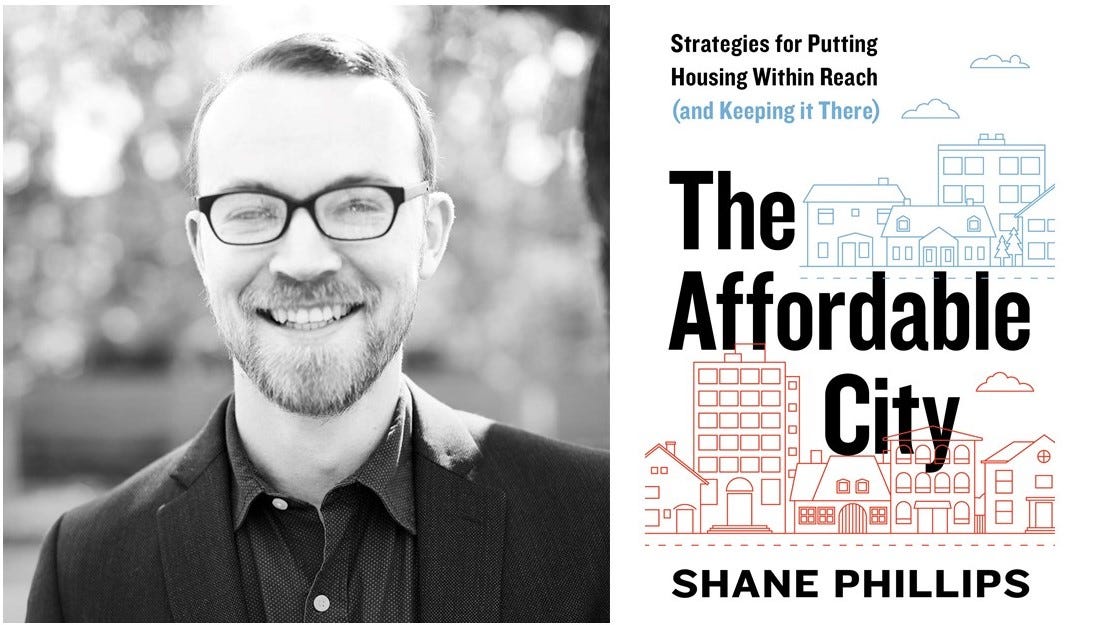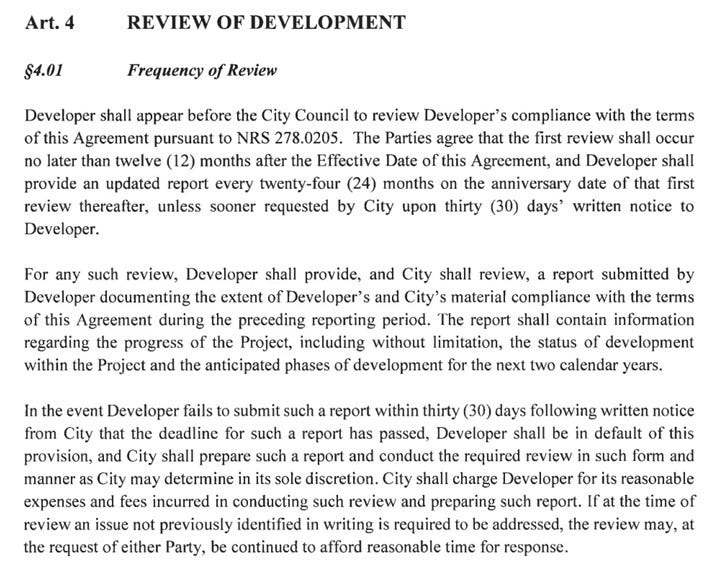Nov. 1, 2023 City Council Special Meeting
Major Zoning & Housing Policy Changes to be Considered
Reno City Council recently scheduled a special November 1st “workshop” meeting, and I suspect most readers aren’t aware that it’s happening since I just learned about it myself a few days ago. But it’s an important one, as Council will be discussing and most likely directing staff to initiate the process of changing multiple City policies and procedures with an eye to facilitating more affordable housing in Reno.
Changes to code and policy can sound a bit dry, but they have the potential to impact every neighborhood in the city. That’s why it’s important for all residents to understand precisely what’s being contemplated, in order to help determine all of their potential repercussions. The first step is simple awareness, so this Brief won’t include much analysis—mostly just information about the purpose of the meeting, the items to be discussed, and the potential actions that City Council might take.
And just to reiterate: City Council will not actually be CHANGING any sections of the City code on Wednesday; however, they will very likely direct staff to initiate the process of instigating specific changes. As a result, it’s important for any residents with an interest in these topics to express your interests, concerns, and recommendations to our representatives as soon as possible.
11/1: Reno City Council Workshop Meeting
Wednesday’s meeting is described as a “workshop” and will start at 10am. You can find the full agenda with links to staff reports and supporting materials here. It includes presentations and discussions related to housing affordability, the Title 18 Zoning Code “Clean-Up” (which also proposes some significant additions), and potential direction to staff to start the process to amend the City’s land development code regarding accessory structure and accessory dwelling units (ADUs).
Here’s a quick overview of each item.
Item B.1 Staff Report (For Possible Action):
Presentation and discussion by Shane Phillips on Local Strategies for Improving Housing Affordability.
You can read the Staff Report for Item B.1 here. As it states, the City recently hired Shane Phillips, manager of the Housing Initiative at the UCLA Lewis Center for Regional Policy Studies and author of The Affordable City: Strategies for Putting Housing Within Reach (and Keeping it There) (Island Press, 2020) to analyze Reno’s housing situation and provide recommendations.
Mr. Phillips did not make any public appearances while in town (to my knowledge), but according to the Staff Report, he “reviewed the City’s zoning, development standards, impact fees, planning documents, and other housing policies and programs….interviewed City staff, toured Reno’s neighborhoods, and spoke with private sector stakeholders from the development community.”
You can read Mr. Phillips’ subsequent 73-page report with recommendations on “Local Strategies for Improving Housing Affordability” here. It includes an analysis of Reno’s “Housing Strengths” and “Challenges and Barriers to Affordability in Reno” and then provides recommendations in five categories:
Infrastructure planning and development fees
Project review streamlining and interagency coordination
Incremental and “missing middle” infill housing production
Zoning, development, and code standards
Displacement protections and housing preservation
The summary of his recommendations begins on p. 62 of the report, if you want to just skip to that. And I see that Mike Van Houten of Downtown Makeover has just provided more details about those recommendations in a new post here.
The Staff Report for Item B.1 includes a table that lists each of these five recommendations on one side and then indicates what the City has already done, is doing, or proposes to do in order to follow them.
Item B.2 Staff Report (For Possible Action):
Presentation and potential direction to staff regarding Title 18 Zoning Code Clean-Up items related to housing and affordability.
Item B. 2 asks Council to consider several specific policies that could be implemented in response to Philips’ recommendations, recent state legislation, and other input. You can read the Staff Report for this item here.
There, you’ll see that staff is asking Council to review a number of brand-new proposed changes to the Title 18 Zoning Code and provide feedback to “for staff to move forward.” But the changes that they want Council to review and comment on have already been incorporated into the new draft of the City’s land development code that is being circulated as part of the “Zoning Code Clean-Up.”
Although I can obviously understand the desire to expedite the adoption of strategies to facilitate affordable housing, this is a bit troubling from a procedural perspective. The City’s “Zoning Code Clean-Up” (here’s the City webpage dedicated to it) was intended to resolve only minor issues that came up after passage of the new code:
Regulations that are difficult to administer because they are unclear
Regulations that are inconsistent or conflict with one another
Grammatical errors
Typographical errors
Just ten days ago, the City announced this “Zoning Code Clean-Up” as well as six public meetings (all providing identical info) to discuss it. One of those meetings has already passed, and two more are scheduled for tomorrow (Mon., Oct. 30). According to the posted schedule, the Planning Commission and City Council will be reviewing these proposed changes this coming winter, for final approval in early 2024. So the sooner residents look at these and start asking questions, the better.
I’ll list the remaining public meeting dates below, but it’s important to note that the new initiatives that the City has added to this “Clean-Up” document would constitute some pretty substantial changes to code that would do the following:
Create an exemption from entitlement review for projects that meet 60% AMI [Area Median Income].
Create a process for expedited building permit review for projects that meet 60 percent AMI.
Create new density bonus incentives for affordable housing projects at more than just the 60 percent AMI, including those in the 61-120 percent AMI.
Allow for additional density bonuses for infill projects.
Allow multi-family development with 100 or fewer units to be allowed “by-right” (in specific zoning districts), as opposed to requiring an entitlement review process.
Allow duplex, triplex, and four plex units in additional single-family zoning districts, with the approval of a conditional use permit.
In the 581-page redlined document, the proposed changes relating to the affordable housing components listed above can be found under Article 15 (p. 377-378), in the table of allowable uses starting on p. 134, and in the section on Standards for Residential Uses on pp. 152-155.
Residents should be especially attuned to changes that would allow certain development projects to be exempt from “entitlement review” and simply be allowed “by-right.” Entitlement reviews, as opposed to administrative reviews, occur in public meetings of the Planning Commission and/or City Council and allow for those public bodies and residents to secure information about, review, and potentially improve or mitigate a whole range of factors including potential traffic impacts, neighborhood compatibility, parking, and nuisance issues like noise. Most if not all of those issues would be the same whether or not a project included affordable housing, so does it make sense to skip public review of them?
Another question to ask would be what percentage of a project would have to be dedicated to “affordable” units in order to qualify for these incentives, expedited reviews, exemptions, and density bonuses (additions to the number of permitted units in a zoned area). The full project? Half of it? Less? As written, any affordable units would have to be “comparable and representative” of the rest of the project’s units, but there’s no indication of how many—so that seems like something to be clarified. There also doesn’t seem to be anything in there to prevent a developer from doubling up on bonuses—receiving a density bonus for the number of affordable housing units and an additional density bonus for providing small units. Should there be?
You may, of course, have other questions about these or any of the other changes in that draft document, and I encourage you to ask them, either at City Council or during one of those remaining “Zoning Code Clean-Up” informational meetings:
Mon., Oct. 30th, 8:30-10am at McKinley Arts & Culture Conference Room, 925 Riverside Dr.
Mon., Oct. 30th, 6:00-7:30 pm at O’Brien Middle School, 5000 Silver Lake Blvd
Thurs., Nov. 2nd, 11:45 am-1:15 pm Virtual (pre-register in advance)
Mon., Nov. 6th, 12:00-1:30 pm Virtual (pre-register in advance)
Wed., Nov. 8th, 5:30-7pm at JWood Raw Elementary, 10600 Green Pasture Dr.
You can access the “Zoning Code Clean-Up Comment Form” here.
If you want to be placed on the “Stakeholder List” to receive notifications about upcoming meetings and actions related to these Zoning Code revisions, the City’s webpage directs you to email Grace Mackedon at MackedonG@reno.gov.
Item B.3 Staff Report (For Possible Action):
Presentation and potential direction to staff regarding initiation of amendments to Title 18 of Reno Municipal Code pertaining to accessory structures and accessory dwelling units.
Item B. 3 is focused specifically on ADUs, and you can read the Staff Report here. Unlike the affordable housing strategies being proposed for inclusion in the “Zoning Code Clean-Up,” these changes would be considered in a separate process—a “Text Amendment” to Title 18 (Zoning) that, once drafted, would also first be reviewed by the Planning Commission and then City Council.
An ADU, sometimes referred to as a “granny flat,” is “a smaller, independent residential dwelling unit located on the same lot as a stand-alone (i.e., detached) single-family home.” You can find a great resource page about them from the American Planning Association here.
As the Staff Report indicates, the City of Reno currently prohibits ADUs in most zoning districts, and staff is requesting direction from Council to move forward with drafting an ordinance to allow ADUs “in certain zoning districts.” The report outlines where ADUs are already allowed (seven areas) or prohibited (Country Club Acres), specifying that those areas would not be impacted by a new ordinance.
As part of the process of drafting this ordinance, staff “will engage with the public to collect feedback,” discussing issues like zoning, minimum lot size, maximum ADU size, maximum ADU building height, parking requirements for the ADU, architectural compatibility, and utility connection requirements. But this City Council meeting will be an early opportunity to provide your thoughts to Councilmembers and City staff as they discuss whether to enact such an ordinance and what it might say.
Item B.4 Resolution of the Reno City Council:
Resolution to sunset the 1,000 Homes in 120 Days program (Resolution No. 8729); together with matters which pertain to or are necessarily connected therewith.
Item B.4 would bring an official end to the “1,000 Homes in 120 Days” program which was introduced in October 2019 to incentive rapid development of housing and has so far resulted in the construction of “approximately 123 units” with approximately 611 units currently undergoing building permit review, and 1,035 units under construction.
The Staff Report provides a list of the status of all the projects that were approved as part of the program. Basically, staff is proposing that any project already accepted to the program that submits building permits by the end of the year will still be able to benefit from its fee deferrals, but that’s it.
Item B.6 Staff Report (For Possible Action):
Presentation, discussion, and potential direction regarding the Affordable Housing Sewer Connection Fee Subsidy program and funding from the sewer enterprise fund.
The Staff Report for Item B.6, seen here, lists all the projects for which the City has either reduced or subsidized impact fees, fees collected for the issuance of building permits, and sewer connection fees for affordable housing projects since 2019.
The problem is that those subsidies—totaling more than $7 million so far and projected to exceed $11M by the end of FY2025—were not budgeted in the sewer fund. The only funding limitation put into place when the program was initially established was that “Council must make a determination that reducing or subsidizing fees will not adversely impair the ability of the City to pay when due on any outstanding bonds or other obligations.”
And as the report states, “The program with its current guidelines and funding is not sustainable.”
This agenda item outlines the parameters by which the City is currently enabling these reductions and subsidies and recommends that Council approve an additional $4M spending cap on such fee reductions through the end of FY25; direct staff to evaluate the sustainability of the subsidies; and determine alternate funding sources for the program during its FY26 budget discussions.
Item B.7 Staff Report (For Possible Action):
Review, discussion, and potential approval for staff to negotiate a contract with the Community Foundation of Northern Nevada to manage the City of Reno’s Affordable Housing Charitable Donation Fund.
Item B.7 would formalize the way in which the City of Reno has started to condition their approval of some (but not all) housing projects on their payment of a donation to support affordable housing. The Staff Report, seen here, indicates that “The intent of the affordable housing charitable donation by developers was to create a fund for affordable housing, while also providing the developers with a tax incentive.”
The report lists the five projects that they have already required to make such donations (of varying per-door amounts), for a total of about $4.2 million to be received sometime in the next one to ten years. Staff indicates that the money could be directed toward areas including the following:
Competitive grant cycles focused on nonprofits delivering affordable housing
Direct investment into affordable housing projects
Purchase and managing properties held in perpetuity for affordable home ownership
Staff is recommending that Council direct staff to move forward with setting up a fund with the Community Foundation of Northern Nevada (CFNN) so that these donations would go straight into that fund rather than to the City of Reno, while allowing the City to retain “maximum control of the fund management.”
Public Comment for the November 1 Special Meeting
As usual, the public can contribute to the discussion for all items on the November 1 agenda in multiple ways, as outlined at the top of the agenda:
Email publiccomment@Reno.gov
Fill out the public comment form at Reno.Gov/PublicComment
Leave a voice mail at 775-393-4499
Attend the meeting in person at Reno City Hall, beginning at 10am
Future Ordinance Changes
OF NOTE: In addition to the changes proposed in this “Zoning Code Clean-Up” phase, the City has engaged consultants to work with them on updates to a few other specialized topics: the Telecommunications Ordinance, Appeals Ordinance, and Signs Ordinance. Stakeholder outreach on those topics is supposed to begin “in Fall 2023.” The City’s website includes links to an initial Signs Assessment, Telecommunications Assessment, and Appeals Procedures Assessment (that one contemplates revising who has “standing” to appeal certain decisions, among other things). Again, to receive advance notice on any of those processes, send an email to Grace Mackedon at MackedonG@reno.gov.
The Latest on Jacobs Entertainment
I’m running out of room for today, but if you hadn’t yet heard, a City Council majority on October 25th voted to appeal the decision from the Second Judicial District Court prohibiting two of the three proposed signs for “Reno’s Neon Line District®.” I’ll have more to say about their discussion in the future, but I didn’t have room last time to point out something I recently realized—that the City’s Development Agreement with Jacobs Entertainment is legally required to undergo a formal review in front of City Council no later than 12 months after the date it went into effect, which is the date it was recorded with Washoe County. That was November 21, 2022. Here’s that language in the Development Agreement:
After Wednesday’s Special Meeting, there are only two City Council meetings scheduled for November: on the 8th and 15th. So which will it be?
As always, you can view this and prior newsletters on my Substack site, subscribe for free to receive each new edition in your email inbox, and follow the Brief (and contribute to the ongoing conversation) on Twitter, Facebook & Instagram. If you feel inspired to contribute to my efforts, my Venmo account is @Dr-Alicia-Barber and you can mail checks, if you like, to Alicia Barber at P.O. Box 11955, Reno, NV 89510. Thanks so much for reading, and have a great week.








This is an extremely important meeting and report. Full disclosure: I introduced Shane Phillips to Reno in early 2022. We look forward to the Barber Brief analyses going forward!!
I live in Newlands Historic district. I am strongly against ADU’s in our neighborhood